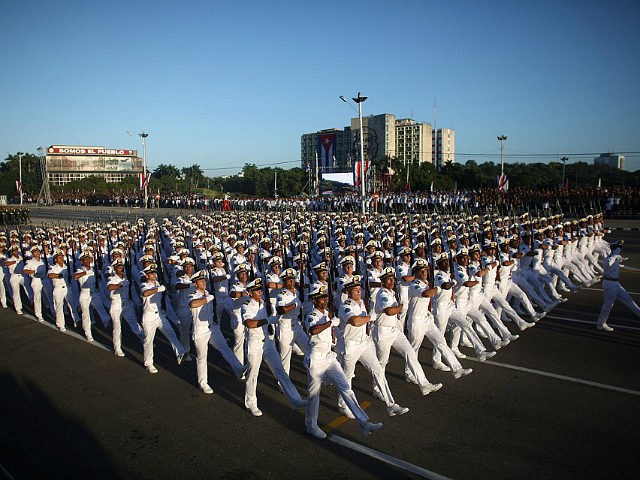In a foreign policy speech on Friday, President Donald Trump is set to announce changes in the United States’ relationship with Cuba, including increased travel restrictions and an effort to stop foreign aid going to “repressive members of the Cuban military government.”
The Cuban military has regularly committed human rights abuses since the 1959 Revolution, including but not limited to the beating and torture of political dissidents, running of forced labor camps, execution of dissidents via firing squad, mass censorship, and no freedom of religion.
Furthermore, rather than private enterprise, it is the military who have benefitted from American tourism, as they own all of Cuba’s most popular tourism companies. Armed forces also currently control the tourist office managing Old Havana, one of the country’s most prominent tourist attractions.
Last year, it was revealed that the military-owned tourism company Gaviota enjoyed a “spending spree” building hotels to improve capacity amid the increasing number of tourists arriving every year. According to Cuba Business Report, over 4 million tourists visited the island in 2016, contributing approximately $3 billion to the country’s economy.
The enrichment of the Cuban military from tourism was a direct result of Barack Obama’s ‘Cuban Thaw,’ in which he tried to normalize relations between America and the island. Obama’s policy included the lifting of travel restrictions, easier transfers of capital between the two nations, and the reopening of foreign embassies in both Washington and Havana.
As part of the negotiations, for example, Obama authorized American hotel company Starwood Hotels to cooperate with the government-run tourist company in organizing tourist programs and travel deals.
Trump’s proposals, reports suggest, are aimed at undoing the ties binding American businesses and the Cuban military. They come after he conducted a full review of U.S. policy toward Cuba, amid his concerns that Obama’s “bad deal” was “enriching the Cuban military and the intelligence services that contribute so much to oppression on the island, and that’s the opposite of what he wanted to achieve, which is to have the benefits of any economic commerce with the United States go to the Cuban people.”
“The President has vowed to reverse the Obama Administration policies toward Cuba that have enriched the Cuban military regime and increased the repression on the island,” until “they provide religious and political freedom to their people,” according to a government official.
Following the death of Fidel Castro last November, Trump described him as a “brutal dictator,” adding he hoped that his death “marks a move away from the horrors endured for too long.”
However, Trump’s proposals have upset pro-Cuba interests groups, including the non-partisan activist group Center for Democracy in the Americas, who CNBC claims have “urged the president to rethink his hitherto hard-line stance on America’s former cold war foe, claiming that the cutting of improved relations would do nothing to help Cuban citizens or serve the U.S.’s national interests.”
Meanwhile, Barack Obama’s former Deputy National Security Adviser Ben Rhodes, who helped negotiate the Iran nuclear deal, described it as a “last illogical gasp of a strain of American politics with a 50-year track record of failure.”
Trump is also expected to receive support from many in Miami’s Cuban community, who believe in strict sanctions against the regime, and Cuban dissidents on the island have already praised the policy as a step in the right direction.
You can follow Ben Kew on Facebook, on Twitter at @ben_kew, or email him at bkew@breitbart.com

COMMENTS
Please let us know if you're having issues with commenting.